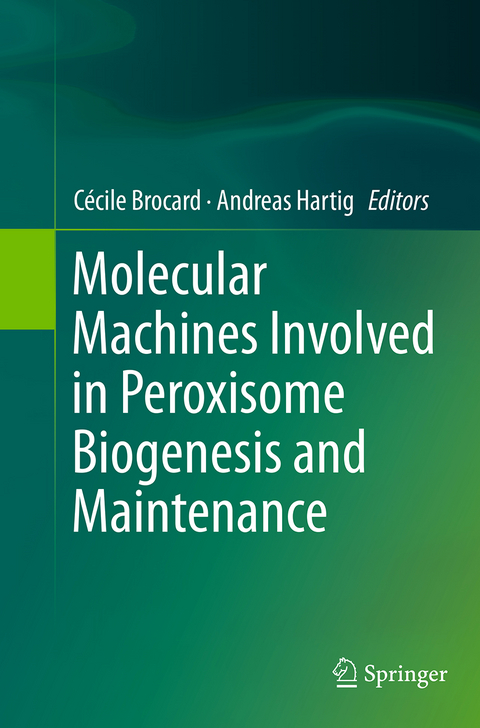
Molecular Machines Involved in Peroxisome Biogenesis and Maintenance
Springer Wien (Verlag)
978-3-7091-1982-2 (ISBN)
Cecile Brocard received her PhD in Biochemistry at the University of Vienna, Austria in 1998. She was CIHR post Doctoral fellow at the University of Western Ontario, Medical Sciences, Canada and at the University of Vienna, Austria, where she also was a Guest Professor from 2006 to 2007. In 2007 she became independent research group leader and Elisa Richter Fellow at the Max-F. Perutz Laboratories in Vienna. Since 2012 Cecile has been Head of research in the start up company Tissue Med Biosciences, in Krems an der Donau, Austria. Andreas Hartig has a PhD in Biochemistry. He was Fogarty Fellow in the Laboratory of Molecular Biology, NINCDS, NIH, Bethesda, USA and Postdoctoral fellow at the Waksman Institute of Microbiology, Rutgers University, in New Jersey and at the Department of Genetics, University of Washington, Seattle, USA. He was research Assistant at the Institute of Biochemistry, University of Vienna, Austria and became Associate Professor in Biochemistry in 1993 where he still works today.
Peroxisome biogenesis and function: History and Discovery of peroxins.- Human cell lines to study peroxisome biogenesis.- Mouse models to study peroxisome biogenesis.- Metabolic interaction between peroxisome and Mitochondria.- Peroxisomal Diseases:The Zellweger spectrum.- Molecular basis.- PEX11beta.- Peroxisome morphology in pathologies.- Other peroxisome-related disorders.- New technologies applied to study peroxisomes: Bioinformatics.- Imaging in plant and peroxules.- Tools to study peroxisomes as signaling platform: oxidative stress studies and antiviral innate immunity.- Proteomic approach. Protein transport across the peroxisomal membrane: The matrix protein import complex in yeast.- Protein transport in plant peroxisomes.- Concept Exportomer.- Factors involved in ubiquitination/deubiquitination of PEX5.- Peroxisome dynamics: Trafficking of the peroxisome biogenesis factor PEX3 through the ER.- Role of PEX3 and PEX19 in peroxisome membrane biogenesis.- Vesicles, reticulon and ER-to-peroxisome contact sites.- Pex11 proteins and their alpha-helix.- Molecular complex coordinating peroxisome morphogenesis.- Dynamin-related proteins. Specific degradation through pexophagy: Principle of selective organelle degradation: Factors involved in pexophagy in the yeast Pichia pastoris.
| Erscheinungsdatum | 22.09.2016 |
|---|---|
| Zusatzinfo | XV, 543 p. 51 illus., 34 illus. in color. |
| Verlagsort | Vienna |
| Sprache | englisch |
| Maße | 155 x 235 mm |
| Themenwelt | Naturwissenschaften ► Biologie ► Mikrobiologie / Immunologie |
| Naturwissenschaften ► Biologie ► Zellbiologie | |
| Schlagworte | Biological Techniques • Biology, life sciences • Biomedical and Life Sciences • Cell Biology • cellular biology (cytology) • Life sciences: general issues • Membrane Biology • Molecular Complex • Organelle Biogenesis • Organelle Fission • Organelle Inheritance • Peroxisome • protein trafficking • Scientific equipment, experiments and techniques |
| ISBN-10 | 3-7091-1982-0 / 3709119820 |
| ISBN-13 | 978-3-7091-1982-2 / 9783709119822 |
| Zustand | Neuware |
| Haben Sie eine Frage zum Produkt? |
aus dem Bereich


